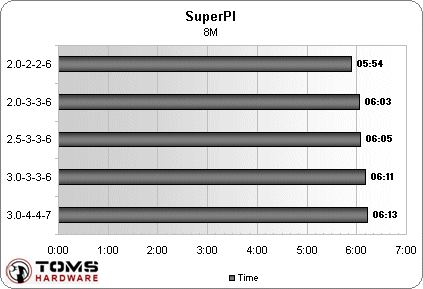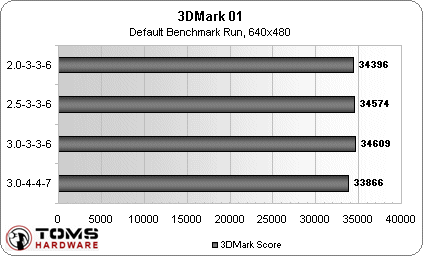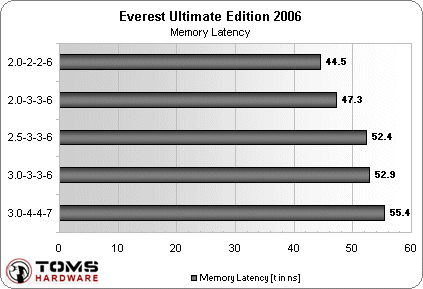Tight Timings vs High Clock Frequencies
Memory Timings Benchmark Impact
The tests were performed with a 290 MHz HTT base speed and a 2/3 memory speed divider, resulting in 193 MHz memory clock - this equals DDR386. This speed is almost as comparable to 290 MHz (DDR580) as DDR400 is to DDR600.




The different timing settings produce nice scaling results in SuperPI, whereas in 3DMark01 the middle three results pretty much just represent normal benchmark run variations. Everest results look normal, and SiSoft Sandra doesn't really seem to care about timings.
What's of most interest here is to compare the most relaxed timings to the tightest timing settings. When keeping the timings and changing the system memory clock frequency from 200 to 290 MHz, we saw 5.2% and 3.5% better performance in SuperPI and 3DMark01. Now, when we're keeping the clock frequency at 193 MHz and changing the timings from CL3.0-4-4-7 to CL2.0-2-2-6 - settings you probably would use when running DDR600 and DDR400 respectively - we see a difference of 5.1% and 5.7%. Interestingly enough, the difference between the best and the worst times in SuperPI is 19 seconds in both cases.
It seems as if 3DMark01, at least, reacts worse to relaxed timings than to slow system memory clock frequencies. In any case, CL2.0-2-2-6 @ DDR386 got outperformed by CL2.5-4-3-7 @ DDR580 in all of our tests. The synchronous HTT/memory speeds when using DDR580 might play a role as well.
These timings can only really be reached at that speed when using 2x 512 or 2x 256 MB modules. For 2x 1 GB modules, if you can find any that actually run at these tight settings, you will have to use CL3.0-3-3-7, or more likely, CL3.0-4-4-8.
Stay on the Cutting Edge
Join the experts who read Tom's Hardware for the inside track on enthusiast PC tech news — and have for over 25 years. We'll send breaking news and in-depth reviews of CPUs, GPUs, AI, maker hardware and more straight to your inbox.
Current page: Memory Timings Benchmark Impact
Prev Page Memory MHz Benchmark Impact Next Page Tight Timings Or High Clock Frequencies?-
jona1 Excellent article. I was looking for a good explanation of memory timings. Thank you (I am from Uruguay, sorry for my bad English :) )Reply -
Good Article I guess. I've been wondering that exact question now that i got 2x1GB of Patriots PC2-8500 Viper Series from NVISION08. The timings are 5-5-5-15 2T at 1066MHz. When i try to lower it 1T it's not reliable. Anyways, thanks tomshardware for another good article, I hope there is a sequel to this, specifically DDR2 or 3 memory.Reply
-
spellbinder2050 ReplyAs most of you are probably aware, the MHz clock speed of the Athlon 64 and Opteron is the product of the HyperTransport speed (HTT) times the multiplier of the CPU.
Correct me if I'm wrong, but shouldn't this be written as, "the MHz clock speed of the Athlon 64 and Opteron is the product of the HyperTransport speed (HTT) and the multiplier of the CPU."
Most Popular

